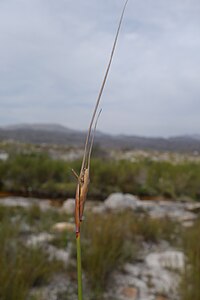Schoenus pictus
| Schoenus pictus | |
|---|---|

| |
| Yellow veldrush | |
| Scientific classification | |
| Kingdom: | Plantae |
| Clade: | Tracheophytes |
| Clade: | Angiosperms |
| Clade: | Monocots |
| Clade: | Commelinids |
| Order: | Poales |
| Family: | Cyperaceae |
| Genus: | Schoenus |
| Species: | S. pictus
|
| Binomial name | |
| Schoenus pictus (Boeckeler) Kuntze
| |

| |
| Documented collection localities in South Africa | |
| Synonyms[1] | |
| |
Schoenus pictus is a species of sedge endemic to the Western Cape Province of South Africa. It is a species usually found on mountain slopes.
Diagnostic characters
[edit]Key diagnostic characters of S. pictus are its relatively firm and thick bracts that surrounding the flower clusters (spikes). These bracts are often yellow-brown in colour in young plants and they envelop the spikes.[1] In addition, the leaf sheaths and part of the flowering stems are usually sticky.[1]
The prominent bracts surrounding the spikes combined with the sticky (viscous) leaf bases distinguish S. pictus from other Southern African Schoenus species.
Similar to other sedges, plants in this group are very difficult to identify. It appears that part of this problem is caused by the tendency of the southern African Schoenus to form hybrids with each other.[2] However, hybridization is yet to be observed in S. pictus.[1]
-
Bases of flowering stems (culms)
-
Flowering head (inflorescence)
-
Flower spikes
-
Spikelet
-
Nutlet
Taxonomy
[edit]Schoenus pictus is a species in family Cyperaceae, tribe Schoeneae.[3] Other notable genera in tribe Schoeneae include Lepidosperma, Oreobolus, Costularia, Tetraria and Gahnia.[3][4][5] The most closely related species to S. pictus are other southern African Schoenus species, specifically, species in the Schoenus compar - Schoenus pictus group.[1]
Southern African Schoenus were once classified as Tetraria; however, based on molecular and morphological differences, we now know that the two groups are evolutionary distinct.[6] To ensure that this group of sedges is monophyletic (i.e. the genus only has closely related species), several species of Epischoenus and the southern African Tetraria were transferred into Schoenus.[6] In the field, the southern African Schoenus can be distinguished from Tetraria species by their lack of stem leaves and the absence of reticulate sheaths at the bases of the flowering stems.[6]
Distribution and ecology
[edit]Schoenus pictus grows throughout the western mountains of the Western Cape Province of South Africa. Most reports of this species are from high mountain slopes surrounded by fynbos vegetation, often from damp sites.[1]
Images
[edit]-
Growth form
-
Growth form
-
Bases of flowering stems (culms)
-
Bases of flowering stems (culms)
-
Flowering heads
-
Flowering heads
-
Flowering heads
-
Flowering heads
-
Flowering heads
-
Flowering heads
-
Flowering head
-
Flowering head with stamens
References
[edit]- ^ a b c d e f Elliott, T.L.; Muasya, A.M. (2018). "A taxonomic revision of Schoenus compar - Schoenus pictus and allies (Cyperaceae, tribe Schoeneae) with three new species described from South Africa". South African Journal of Botany. 114: 303–315. doi:10.1016/j.sajb.2017.11.020.
- ^ Levyns, M. (1947). "Tetraria and related genera, with special reference to the flora of the Cape Peninsula". Journal of South African Botany. 13: 73–93.
- ^ a b Elliott, T.L.; Barrett, R.L.; Muasya, A.M. (2019). "A taxonomic revision of Schoenus cuspidatus and allies (Cyperaceae, tribe Schoeneae)—Part 1". South African Journal of Botany. 121: 519–535. doi:10.1016/j.sajb.2018.11.021.
- ^ Viljoen, J.-A.; Muasya, A.M.; Barrett, R.L.; Bruhl, J.J.; Gibbs, A.K.; Slingsby, J.A.; Wilson, K. L.; Verboom, G.A. (2013). "Radiation and repeated transoceanic dispersal of Schoeneae (Cyperaceae) through the southern hemisphere". American Journal of Botany. 100 (12): 2494–2508. doi:10.3732/ajb.1300105.
- ^ Larridon, I.; Bauters, K.; Semmouri, I.; Viljoen, J.-A.; Prychid, C.J.; Muasya, A.M.; Bruhl, J.J.; Wilson, K.L.; Senterre, B.; Goetghebeur, P. (2018). "Molecular phylogenetics of the genus Costularia (Schoeneae, Cyperaceae) reveals multiple distinct evolutionary lineages". Molecular Phylogenetics and Evolution. 126: 196–209. doi:10.1016/j.ympev.2018.04.016.
- ^ a b c Elliott, T.L.; Muasya, A.M. (2017). "Taxonomic realignment in the southern African Tetraria (Cyperaceae, tribe Schoeneae; Schoenus clade)". South African Journal of Botany. 112: 354–360. doi:10.1016/j.sajb.2017.06.011.

















